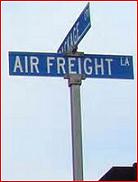Last week, Reed Fawell III noted in his article on this blog, “A Mortgage on Northern Virginia’s Future,” that few Northern Virginians or Washingtonians had paused to ask whether the massive road investments proposed to advance Washington Dulles International Airport as an air-cargo hub made sense. But clearly people are beginning to pose that question. In a Washington Post op-ed today, David Alpert, editor of the Greater Greater Washington blog, took on the Bi-County Parkway, which has been justified largely on the grounds that it would stimulate air cargo-related economic development at Dulles.
If people want to use Dulles, great. But if Dulles lacks demand, our region needs to invest its limited transportation and infrastructure funds where that demand exists.
Northern Virginia’s strength isn’t warehouses. Its strength, and that of the District and Maryland, is knowledge jobs in high tech, biotech and defense. Rather than a $1.5 billion parkway at the edge of the region where demand isn’t strong, let’s put transportation dollars toward growth that will attract knowledge workers and jobs that are the engine of Virginia’s success.
Permit me to elaborate. Dulles needs two things to become competitive as a major air-cargo hub. First, it needs truck-friendly transportation corridors capable of handling as many as 34,000 tractor-trailers daily. Second, it needs the kind of workers who would be happy to work in the largely blue-collar occupations tied to warehousing and distribution. Right now, Northern Virginia has neither.
Northern Virginia is one of the most affluent communities on the planet. Loudoun County, where Dulles is located, has the highest per capita income of any jurisdiction in the country! None of the surrounding counties have zoned for workforce housing. Dulles will not be able to find an industrial workforce locally. Employees will have to commute from many miles away, from places like Winchester, Culpeper and Fredericksburg.
Check the map accompanying Reed’s post. It shows the massive, multibillion-dollar transportation corridors that, in the estimation of the airport itself, Dulles needs to connect to major markets and import an industrial workforce. Without those highways, Dulles will find it very difficult to vault into the air-cargo big leagues.
The North South Corridor, of which the controversial Bi-County Parkway near Manassas Battlefield Park is a key part, would provide only a fraction of that connectivity. In other words, the $1.5 billion that Alpert cites for the cost of the North South Corridor and related improvements is only a fraction of the investment that Dulles really requires. The actual cost is likely in the multiple billions of dollars, some portion of which would be paid for by tolls. No one has tallied a price tag on the projects for the likely reason that the public would gag at the number. Instead, Dulles officials and their allies appear to be pursuing a strategy of pursuing piece-meal improvements that won’t cause sticker shock.
Meanwhile, the Dulles agenda has become the economic-development agenda of Loudoun County, Prince William County and the Commonwealth of Virginia. If Northern Virginians are going to be asked to help pay for the transportation infrastructure, they have the right to ask themselves what kind of future they want for their region. If they decide they want to morph from a high-tech hub into a middle-tech logistical hub, that’s their business. But I’m dubious that’s the vision most would choose. With luck, Reed’s article and Alpert’s op-ed will stimulate more debate.



